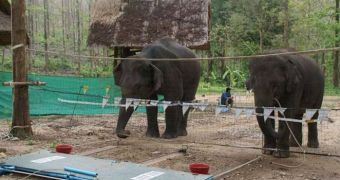In a recent set of studies, researchers have demonstrated that elephants have the same natural instinct of knowing when to help their fellow group members that humans and primates do. This has never been shown in other animals before.
It's not that biologists and animal behavior experts didn't know that elephants cooperate. This has been a fact for centuries. What they didn't know was that the instinct comes naturally to the large mammals.
This complex level of intra-societal cooperation has until now only been displayed by humans and our closest relatives, but it seems that there is now a new member in this exclusive club.
Species such as humans, dolphins and chimpanzees are the most intelligent on the planet. All of them posses advanced brains, capable of higher forms of thinking. Elephants proved capable of that too.
The reason why this was not found out earlier is due in part of the difficult nature of the work involved with studying such large animals. But researchers in the United Kingdom finally managed to take their studies all the way to a definite conclusion.
In the new experiments, experts simply adapted an experiment commonly used to assess intelligence in primates for the large animals. “It's a great task originally designed for chimpanzees by a research group in Japan,” explains researcher Joshua Plotnik.
“It seems simple, but actually requires quite a bit of understanding,” adds the expert, who holds an appointment as a comparative psychologist at the University of Cambridge, in the UK.
He is also the head of elephant research for the Golden Triangle Asian Elephant Foundation, based in Chiang Saen, Thailand. He and his group base their conclusions on a study of 12 Asian elephants.
In the task they were presented with, the mammals had to work together in a coordinated manner, in order for each of them to gain a bucket full of corn. It was only through working together that the elephants could get to the tasty treat, LiveScience reports.
They had to pull on two ropes simultaneously with their trunks. When only one rope was pulled, the table containing the treats became unreachable, and none of the elephants in the study pairs got corn.
“Cooperation itself isn't very unique – species from honeybees to lions cooperate in various ways, but what these animals 'understand' about how cooperation works is debatable,” Plotnik explains.
“For many species, cooperation probably doesn't require much cognition at all, as much of the behavior is 'pre-programmed',” he goes on to say.
“We found that elephants would wait at their rope end as long as 45 seconds – they understood that pulling without the partner wouldn't earn any reward,” the expert adds.
“This is a very long time for an animal to inhibit their pulling when they know that good food is just out of reach,” he concludes.
Details of the new investigation are published in the March 7 online issue of the esteemed journal Proceedings of the National Academy of Sciences (PNAS).

 14 DAY TRIAL //
14 DAY TRIAL //